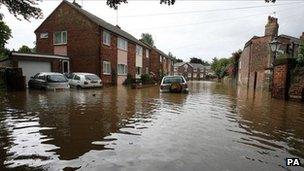200,000 homes 'at flooding risk'
- Published

Up to 200,000 homes will face insurance problems when a government agreement ends next year, the Association of British Insurers (ABI) has said.
It mapped neighbourhoods with the highest risk of flooding in England and Wales - and where residents may struggle to insure their homes.
Boston and Skegness, and the Vale of Clwyd face the greatest risks, it said.
The government said it was working with the industry to try to make sure the arrangement continues after June 2013.
The pact obliges insurers to provide cover for high-risk properties while the government continues to improve flood defences.
The ABI wants the government to share the risk for the most vulnerable properties.
"We are frustrated with the progress of our talks with the government on this issue and want it to look urgently at a model that would allow flood cover to remain widely available and competitively priced," said ABI director general Otto Thoresen.
"No country in the world has an entirely free market providing universal affordable flood insurance, and action is needed now to avoid 200,000 high-risk homes struggling to afford cover."
Environment Minister Richard Benyon told BBC: "We live in difficult times, it is wrong to impose impossible burdens on the taxpayer, but we do want to make sure that insurance continues to be available for the vast majority of households."
"We will assist particularly households on low incomes," he said.
The Department for Environment, Food and Rural Affairs (Defra) said it would consider targeted support over the next few months and said further announcements would be made in the spring.
Agreement
The ABI has analysed official data to highlight the areas with the most homes at significant flood risk - defined as a greater than one in 75 chance of flood in any given year.
Boston and Skegness headed the list, with 7,550 homes facing significant risk. This was followed by the Vale of Clwyd, with 7,339 homes at risk, then Folkestone and Hythe (7,196), Windsor (7,125), and Runnymede and Weybridge (6,541).
Nick Starling, from the Association of British Insurers, says 200,000 homes will find it hard to get insurance
The ABI said that these homes faced problems in getting insurance after June 2013, when the agreement ends.
It claimed that, at present, people in lower risk flood areas paid more in premiums than would otherwise be the case to subsidise those at higher risk, and customers in high-risk areas were tied to their existing insurer.
'Priority'
Meanwhile a committee of MPs has raised concerns about what funds are available to maintain flood defences.
It was unclear "where the buck stops" for managing the risk of flooding, a report by the Public Accounts Committee (PAC) said.
The PAC said that there was a great deal of uncertainty about whether there was enough money to improve flood defences and protection in the long-term, and who paid for it.
The current bill is at least £1.1bn a year, according to the committee of MPs, and this is set to rise owing to climate change.
A recent assessment for the government claimed that this could go up to between £1.5bn and £3.5bn a year by the 2020s.
"Flood protection is a national priority. Yet it is unclear where the buck stops and who is ultimately responsible for managing the risk of flooding," said Margaret Hodge, who chairs the PAC.
"It is not acceptable that local people should be left in doubt about where responsibility and accountability lie."
Runnymede Cllr Derek Cotty: There's no votes in people who live by the river
Environment Minister Richard Benyon said his department was spending £2.17bn on flood prevention over the next four years.
Its budget was cut by 6% in the Spending Review, he said, but he maintained that this was much smaller than the cuts made to some other departments.
"We protected flood spending out of all proportion... showing that it is of real importance to the government," Mr Benyon told BBC News.
'Not optimistic'
The PAC report said that with people being asked to pay more towards flood protection in their area and take on more of the risk, the Environment Agency needed to involve communities better in decisions on flood protection.
One of those areas highlighted by the ABI as facing significant flood risks was Runnymede in Surrey, which has the Thames and Bourne rivers running through it.
Conservative councillor Derek Cotty, who is chair of the local flood forum, said it was "devastated" that nothing had been done after the last serious floods in 2003.
"We are now very concerned that the flood defences that were promised us have not been put in place because the money has not been found," he told the Today programme.
He said it was fair in theory that local authorities or local businesses should be asked to share some of the financial responsibility of providing flood protection, but the financial reality was very different.
"When you look at the sums of money - in our region over £100m - it simply isn't possible," he said.
- Published31 January 2012
- Published28 December 2011
- Published7 November 2011
- Published13 December 2011